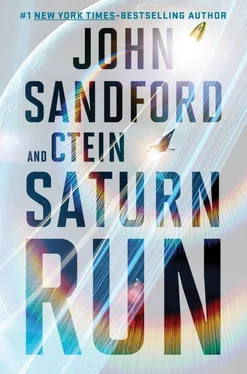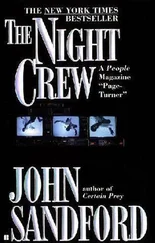“The impact possibly broke her neck, very probably gave her a fatal concussion, and at an absolute minimum knocked her out. There is no possibility she retained any consciousness.
“Low-grade status-sensor telemetry continued for another 3.1 seconds before cascading and catastrophic system failures disabled all communications from the egg. During that time, life-support monitors reported falling pressure in the cabin as well as rapidly increasing contamination of the air. We can’t tell from the incomplete data if this was smoke from onboard fires or ruptures of chemical lines or scrubbers that allowed toxins to enter the air system. Within seconds, at most, the air inside the cabin became fatally unbreathable and/or vented into space. If the impact did not kill Dr. Johansson outright, she died very quickly from asphyxiation or toxin inhalation.”
Ah well, Fang-Castro thought, as she filed the report.
Becca .
Greenberg tilted back and closed her eyes, just for a second—though she didn’t know exactly how long the “second” lasted. The night before, she’d had the granddaddy of all cliché anxiety dreams: all the reactor tests were going wrong, every Level 2 tech had called in sick, she had totally forgotten Fang-Castro was showing up to inspect their progress, she really needed to pee, and on top of all that she’d somehow neglected to get dressed so she was floating next to the primary coolant control panel, naked, when Fang-Castro and Francisco entered the compartment.
None of that resembled the actual case.
The whole crew was running on illegal amounts of stims, but things were getting done. Short of any unexpected problems, they’d be moving again five days after the accident; maybe less.
Desperation was the mother of, well… something… and she desperately wanted to avoid cross-coupling asymmetric heat flows or any of the other dubious suggestions she’d heard. Previous discussions between Fang-Castro and the late chief engineer notwithstanding, Greenberg was going to run the power plant by the book.
What she was actually doing, she thought, was scheduling , rather than engineering. She’d read somewhere that the most successful generals were not the combat heroes, but those who could best manage traffic, and get fuel and food and ammunition to those who needed it.
Greenberg worked out ways to cut corners, to schedule work in parallel, even to schedule jobs by temperature. As much as possible, work that could be done on a hot heat exchanger was scheduled for the very beginning and very end of the repair queues. She’d been able to get some repair teams on the job within hours of the status meeting the morning after the accident, instead of having to wait a full day for the radiator metal reservoirs to come down to safe temps.
Conversely, as soon as all the fixes that demanded low-temp conditions were completed, she’d ordered the heaters turned on to bring the melt reservoir back up to operating temperature. She had given that word the night before, and currently was waiting on the inspection of the last of the high-temp work.
Becca might have been a tiny bit better as an engineer, Greenberg thought, but I’m a better manager. She was currently avoiding doing the one thing that Becca wouldn’t have avoided: she refused to get in the hair of people who already knew what they were doing and were doing it as fast as they could. Becca would have been on them with a whip, and that would have slowed things down.
She was still sitting with her eyes closed—only for a second—when her wrist-wrap tapped her, and she checked her slate: and she got the sign-off by the inspection team. Time to start making radiator ribbons.
She had a few new moves here, as well. Previously, they were in no hurry to fire up the engines—back then, a few hours one way or another hadn’t mattered. Now they did. Her magneto-dynamicists had burned up the models and figured out that radiator ribbons separated by more than ten meters didn’t really interact with each other. When it came to radiator sail stability, it didn’t matter whether Engineering extruded the ribbons one at a time or started up one in every dozen ribbons simultaneously. It required more people to monitor status boards when fifteen new ribbons got extruded at once, but that was all. She had the people…
She touched her comm controls, straight through to Fang-Castro: “Captain, we’re ready to start generating real power again. Should be about two hours from start until we have you at one hundred percent. Awaiting your command.”
“Thank you, Dr. Greenberg. Great job. You’re instructed to bring Reactor 1 up to full power.”
Greenberg: And now we’ll find out if I’m as good a power engineer as Becca thought I was when she made me her second.
Two hours later, she decided she was. Power-up came off without a hitch, and the Nixon began its long deceleration burn. They were still half a billion kilometers sunward of Saturn, but it would take until the end of January to kill all of the ship’s prodigious velocity. By then they’d have overshot their mark by nearly a hundred million kilometers.
The race to Saturn was far closer than the most pessimistic of the mission planners expected.
There’d been no earlier formal memorial ceremony for Rebecca Johansson: too many people who knew her well—the engineers—would have been unable to attend.
The memorial was held the evening of the restart.
Many people cried.
Sandy simply sat there, feeling—and looking, he thought—fairly stupid. In addition to messing with your hormones, the drugs did take out a piece of your brain.
Maybe he should just stay on them forever, he thought.
Real feelings had never really worked that well for him.
Fang-Castro ran into Sandy as they converged on the Commons. As the captain, she did not touch subordinates for good, legal reasons. Now she hooked Sandy’s shirt with a couple of fingers and pulled him aside.
“How are you? Dr. Ang told me you’re coming off the drugs.”
“Just in time for New Year’s,” Sandy said. Becca had been killed two months earlier; they were approaching the orbit of Saturn, though they wouldn’t be stopping there. And, “Thanks for asking, ma’am. I’m feeling fairly bad. Going through the brooding phase, as he calls it. The what-ifs. Dr. Ang tells me that’s good. I’m getting my mind back.”
“The post-traumatic stress…?”
“I’ve dealt with it, you know, for a while. This is a bump in the road, but I’ll be okay.”
She touched his arm: “Very good. I pressed Mr. Crow on your previous service, so I’d know what I was dealing with. I have a good deal of admiration for you, Captain, and you are a most excellent cameraman, as well. I would be pleased to have you on any of my ships, even if you were in the army.”
“Thanks… I’ll remember that, ma’am.”
They went on to the New Year’s celebration.
____
New Year’s Eve aboard the Nixon was one for the record books, Fang-Castro thought, as she and Sandy entered the Commons. People had celebrated the coming of the new year for millennia, but never before in a spaceship over a billion kilometers from Earth.
And despite the cheerful dressing, there was a touch of melancholy to it, as well—they were still feeling the loss of their chief engineer.
But as Sandy had said, on the day of the accident, probably in shock but also in truth, dead was dead. Rebecca Johansson was slipping irretrievably into the past, and here, in the present, Phillip McCord, a Nobel physicist, the only Nobel on board, was serving as a most excellent bartender, pouring a most excellent champagne.
Читать дальше








